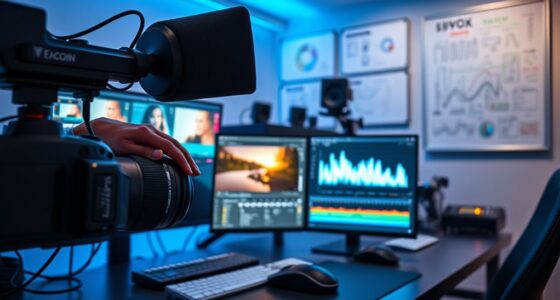When interviewing witnesses, it’s best to use neutral, open-ended questions that encourage detailed responses. Create a calm, supportive environment to build rapport and make them comfortable sharing. Avoid leading or biased questions, and give them time to recall memories without pressure. Patience and a gentle approach help improve answer quality and honesty. Mastering how you phrase questions and setting the right environment will lead to more trustworthy insights—continue to explore how these techniques can elevate your interview skills.
Key Takeaways
- Use open-ended, neutral questions to encourage detailed and unbiased witness responses.
- Create a calm, supportive environment to build rapport and reduce stress during interviews.
- Allow sufficient time for witnesses to recall memories without rushing or interrupting.
- Avoid leading or suggestive questions to prevent influencing witness accounts.
- Maintain neutrality and patience to enhance the accuracy and completeness of information gathered.

Have you ever wondered how investigators gather essential information from witnesses? It all starts with understanding the importance of effective interviewing techniques. One key aspect is how witnesses recall their memories. Memory recall isn’t always perfect; details can fade or become distorted over time. That’s why investigators pay close attention to how questions are phrased. The way you phrase a question can considerably influence the accuracy and completeness of the witness’s response. Open-ended questions encourage witnesses to provide more detailed accounts, helping them access their memories more freely. For example, instead of asking, “Did you see him run?” you might ask, “Can you tell me everything you remember about what happened?” This approach allows witnesses to share their recollections without feeling pressured or limited by restrictive questions.
Question phrasing is a powerful tool in eliciting clear, reliable information. Leading questions, which suggest a particular answer, can unintentionally bias the witness and compromise the integrity of their testimony. Instead, neutral language should be used to avoid influencing the witness’s recollection. For instance, asking, “What did you see happen?” is more effective than “You saw him leave the scene, right?” because it keeps the witness’s account unbiased. It’s also important to give witnesses time to think and process their memories before responding. Rushing them or asking multiple questions at once can confuse or overwhelm them, reducing the accuracy of their recall. Gentle prompts and patience help witnesses access their memories more thoroughly. Additionally, understanding the role of memory in accuracy can help interviewers better interpret the reliability of a witness’s account.
In addition, the context and environment of the interview matter. Conducting the interview in a calm, non-threatening setting encourages honesty and openness. Building rapport with the witness helps them feel comfortable, making it easier for them to recall details without fear or hesitation. It’s equally important to avoid leading questions that suggest a specific answer, as they can inadvertently shape the witness’s responses. Instead, you want to guide the conversation with neutral, well-phrased questions that promote free recall. Remember, the goal is to gather as much accurate information as possible, and that depends heavily on how you frame your questions and support the witness’s memory recall process. By mastering question phrasing and creating a supportive environment, you considerably increase the quality of the information obtained during the interview.
Frequently Asked Questions
How Do You Build Rapport Quickly With Witnesses?
To build rapport quickly with witnesses, focus on establishing trust through genuine empathy and open body language. Use active listening to show you value their input, making eye contact and nodding to demonstrate understanding. Keep your tone friendly and non-judgmental, encouraging them to share details comfortably. By being attentive and respectful, you create a safe environment where witnesses feel valued, making them more willing to cooperate and share vital information.
What Are Common Mistakes to Avoid During Interviews?
Avoid common mistakes like using leading questions or overlooking memory decay, which can distort the witness’s account. If you rush the interview or show impatience, you risk contaminating their memory. Stay neutral, listen carefully, and give witnesses time to recall details without pressure. Remember, pushing too hard can cause inaccuracies, so keep your questions open-ended and non-suggestive to preserve their true story.
How Do You Handle Uncooperative Witnesses?
When handling uncooperative witnesses, you should remain calm and patient, offering emotional support to help them open up. Be aware of legal considerations, ensuring you don’t lead or pressure them, which could compromise the interview. Gently clarify your questions and reassure them about confidentiality and their importance. This approach fosters trust, encourages cooperation, and helps gather accurate information while respecting their emotional state.
What Techniques Ensure the Accuracy of Witness Recollections?
To guarantee accuracy of witness recollections, you should focus on minimizing cognitive biases and enhancing memory recall. You can do this by asking open-ended questions that encourage detailed responses and avoiding leading questions that might influence memory. Reconstruct the scene with visual or sensory prompts, as these techniques help jog memory. Staying neutral and patient allows witnesses to access their memories more freely, ultimately capturing more accurate, reliable accounts.
How Do You Document Witness Statements Effectively?
You document witness statements effectively by using clear interview techniques that encourage detailed responses. Record their words verbatim whenever possible, and take detailed notes during the interview. Always guarantee evidence preservation by securely storing the recorded statements and notes, maintaining chain of custody. Follow a consistent process, verify accuracy with the witness, and timestamp all documentation. This approach ensures the integrity and reliability of the witness testimony.
Conclusion
Remember, interviewing witnesses is like tending a delicate garden—you must nurture trust and patience to uncover the truth. Every question is a seed, and your careful listening helps it grow into clarity. When you approach with empathy and open-mindedness, you create an environment where memories bloom. Keep these best practices in mind, and you’ll turn each interview into a step closer to justice, a beacon shining through the fog of uncertainty.









